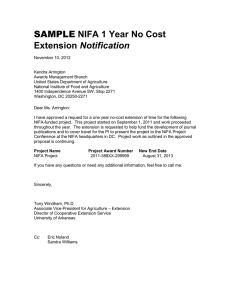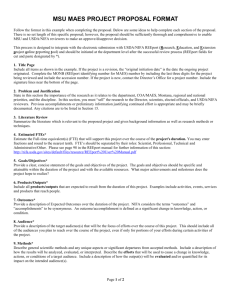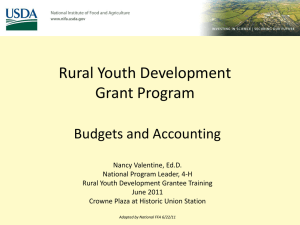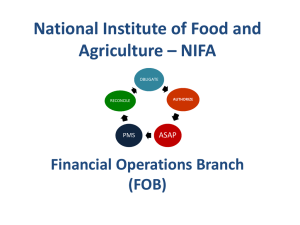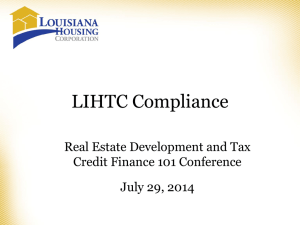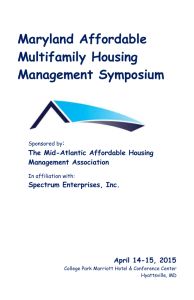The Low Income Housing Tax Credit (LIHTC) Program
advertisement
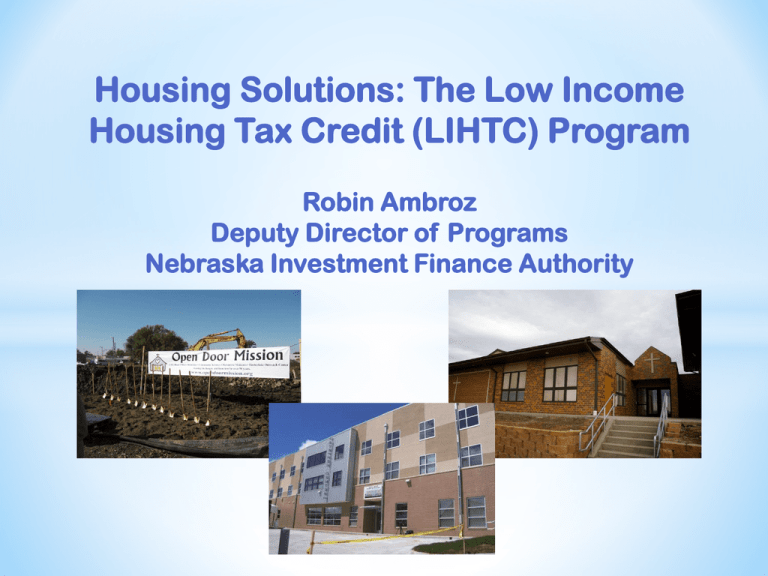
Housing Solutions: The Low Income Housing Tax Credit (LIHTC) Program Robin Ambroz Deputy Director of Programs Nebraska Investment Finance Authority LIHTC Program: The Details *Established under the Tax Reform Act of 1986 *An effort to partially privatize the affordable housing industry *Program works by providing investor equity, thus reducing the amount of debt service on a project, allowing lower rents to be charged to tenants while still producing positive cash flow *Provides a dollar-for-dollar reduction in tax liability for owners (and the partners of the owners) Basic Requirements *Low Income Units: * Rent & Income restricted to a minimum of either * 20% of units at 50% of AMI or * 40% of units at 60% of AMI * Points given in application process for lower income targeting *Affordability Period: * Minimum of 30 years (15-year initial compliance period & 15-year extended use period) * Points given in application process for longer affordability periods How it works *Project owners are generally Limited Partnerships or Limited Liability Companies *Equity generated from LIHTC typically covers 60-70% of project costs *Sources to fill the gap * HOME Funds * NE Affordable Housing Trust Funds * FHLBank of Topeka * Permanent Loan * Deferred Developer Fee * Additional Equity Contributions Project Structure TBD Bank (Lender) Tax Credit Investor (99.99 % Limited Partner) NIFA (Tax Credit Allocation) TBD Apartments, L.P. (Project Owner) NDED, FHLBank, City, etc. (gap funds) Non-Profit or For Profit Sponsor \ Developer (.01% General Partner) Annual Qualified Allocation Plan (QAP) *The QAP governs the annual distribution of tax credits. *QAP Process: *Focus Group Meetings *NIFA \ NDED planning sessions *Public Hearing *Board Approval *Governor’s Approval Application Process: Competitive Cycle *Threshold Review (optional) * Applications are reviewed for the threshold requirements * Applicant receives feedback regarding the threshold items in their application. *Final Review * Applicants must meet threshold requirements before the development can be considered for an allocation. * Points awarded for specific items contained in the application. Application Process: CRANE *CRANE = Collaborative Resource Allocation for Nebraska * Difficult-to-Develop Projects * Negotiated Outcomes \ Individualized timelines * Public Process \ Monthly Meetings *Eligible Project Type: * Housing for individuals with special needs *Must meet all Threshold items & complete entire application Cirrus House *48 units for individuals with Severe Mental Illness completed in 3 phases *New construction completed in 2003, 2006, and 2012 Stephen Center *16 Two-bedroom units for men & women in their HERO program *Shared restroom and dining facilities *New construction completed in 2006 *Received allocation for additional 61 units in 2013 People’s City Mission: Curtis Center *60 Single Room Occupancy Units for men *Shared restroom & dining facilities *New construction completed in 2008 Christian Worship Center: New Visions *14 Efficiency Units for Veterans *New construction completed in 2010 Open Door Mission: Rebuilding Lives *219 units in 3 phases * Single Room Occupancy * One, Two, and Three Bedroom Units * Shared common areas * Serving men, women, and families with children *New construction completed in 2009, 2011, and 2012 Siena / Francis House: Siena / Francis Apartments *48 One-bedroom units * Shared common space * Single men & women *New construction completed in 2012 Contact Information: Teresa Kile LIHTC Manager teresa.kile@nifa.org Kelly Schultze LIHTC Assistant Manager kelly.schultze@nifa.org Nebraska Investment Finance Authority (NIFA) 1230 ‘O’ Street, Suite 200 Lincoln, NE 68508 402-434-3900 www.nifa.org
